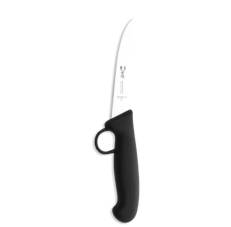In commercial food processing, efficiency, precision, and safety are paramount. Whether processing meat, poultry, or seafood, the right knife can make all the difference in productivity and product quality. High-quality, purpose-built knives help reduce waste, improve worker safety, and ensure consistent cuts that meet industry standards. Selecting the right knife for each application is crucial. This blog discusses various knife types and factors to consider during the purchasing process to help food processors find the best knife for their unique use cases.
Essential Knife Types for Commercial Food Processing
Boning Knives

Best for: Meat, poultry, and fish processing
Boning knives are crafted to remove bones from meat, poultry, and fish with accuracy, but they come in a range of shapes and sizes to suit different tasks. While thinner, curved, and flexible blades are ideal for navigating joints and making precise cuts in delicate proteins like fish and poultry, not all boning knives share this design. Larger, stiffer blades—often hollow ground to reduce resistance—are better suited for tougher cuts like beef and pork. Curved blades are commonly used for slicing and trimming fat.
Key Considerations:
-
Blade material: Stainless steel resists corrosion and is easy to clean
-
Handle: Ergonomic, non-slip handles improve grip and reduce worker fatigue
-
Edge retention: High-carbon stainless steel ensures long-lasting sharpness
Wolff Industries provides high-performance IVO® boning knives that maintain sharpness over extended use, ensuring efficiency in meat processing operations.
Read More: Best Boning Knives for Poultry Processing
Breaking Knives

Best for: Cutting large sections of meat into smaller portions
Breaking knives are designed to break down carcasses and cut through thick meat and cartilage, making them essential tools in butcher shops and meat processing facilities for performing primal cuts. While many breaking knives feature a broad, curved blade to aid in slicing through large sections of meat, not all follow this design, though the curved style is common for this type of knife.
Key Considerations:
-
Blade length: Typically ranges from 8" to 12" for versatility
-
Strength: A rigid, durable blade prevents flexing during heavy-duty cuts
-
Hygiene: Seamless handle construction prevents bacteria buildup
IVO® breaking knives are built for power and precision, helping processing professionals achieve clean, efficient cuts while maintaining sanitation standards.
Fillet Knives

Best for: Seafood processing
Fillet knives are known for their thin, razor-sharp blades and varying levels of flexibility, making them ideal for removing fish skin and filleting delicate seafood. While many are fully flexible to allow for close, precise cuts, semi-flex and even stiff blades are also common and better suited for certain types of seafood. Most fillet knives feature rubberized handles, providing a secure grip in the wet, demanding conditions of seafood processing.
Key Considerations:
-
Flexibility: Enables smooth gliding through fish fillets
-
Corrosion resistance: Stainless steel or coated blades withstand moisture and salt exposure
-
Grip: Textured, slip-resistant handles improve control in wet environments
For seafood processors, IVO® fillet knives combine sharpness and flexibility, ensuring clean, precise fillets with minimal effort.
Slicing Knives
Best for: Large cuts of meat, deli meats, and cooked foods
![]()
Slicing knives feature long, narrow blades that are typically thinner and more flexible, allowing for smooth, even cuts with minimal resistance or tearing. This design makes them ideal for use in commercial kitchens, meat processing plants, and deli operations where clean, uniform slices are essential.
Key Considerations:
-
Blade edge: Granton edges (scalloped grooves) reduce friction and prevent meat from sticking
-
Length: Typically 10" to 14" for handling large cuts efficiently
-
Durability: High-carbon stainless steel ensures longevity and sharpness retention
IVO® slicing knives help food processors achieve consistent portioning, reducing waste and improving product presentation.
Skinning Knives
Best for: Removing animal hides in meat processing

Skinning knives are designed with a short, wide, and slightly curved blade that allows for the precise, efficient removal of hides from livestock such as cattle, pigs, and sheep. These knives typically feature thicker blades to prevent bending during the skinning process, ensuring smooth cutting motions while minimizing damage to the underlying meat.
Key Considerations:
-
Blade shape: A curved blade ensures clean, controlled cuts while reducing waste
-
Durability: High-carbon stainless steel maintains sharpness for extended use
-
Grip & comfort: Ergonomic, slip-resistant handles provide control and reduce hand fatigue
-
Sanitation: Seamless construction prevents bacteria buildup in food processing environments
IVO® skinning knives are built for durability and efficiency, helping meat processors achieve clean, precise hide removal while maintaining hygiene and safety standards.
Key Factors to Consider When Choosing Commercial Food Processing Knives
Blade Material: High-Carbon Stainless Steel
Wolff Industries uses high-carbon stainless steel for all its knives—an ideal material for meat processing due to its excellent resistance to stains and rust, along with superior edge retention that ensures lasting sharpness and performance.
Edge Retention & Sharpness
A dull knife can slow down operations and increase the risk of injuries. Knives with high edge retention require less frequent sharpening, improving workflow efficiency. And while no injury is ideal, clean cuts from a sharp knife are far safer and easier to treat than jagged wounds caused by dull blades.
Ergonomic Handles & Worker Safety
Food processing professionals handle knives for extended periods, making ergonomic, non-slip handles essential for reducing strain and preventing accidents. Wolff Industries offers multiple handle styles made from various materials to meet the needs of different processing environments and user preferences.
Sanitation & Hygiene
Seamless, easy-to-clean knife designs with antimicrobial handles help food processors meet strict hygiene standards. Wolff Industries ensures all knives comply with food safety regulations.
Trust Wolff Industries for High-Quality Food Processing Knives
Keeping your food processing knife inventory stocked is crucial for efficiency, safety, and product quality. From boning and breaking knives to fillet and slicing knives, each type serves a specific purpose to optimize workflow and reduce waste. Wolff Industries is committed to providing food processing professionals with industry-leading, high-performance knives designed to withstand the demands of high-volume production. Explore our full range of commercial food processing knives today and equip your facility with the best tools for your application to help you achieve long-term success.


